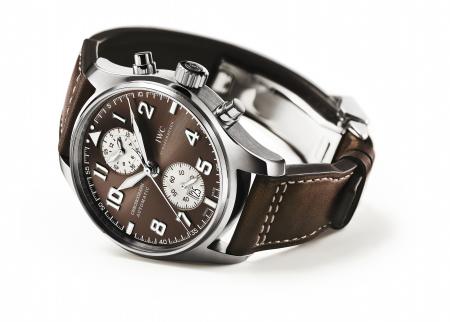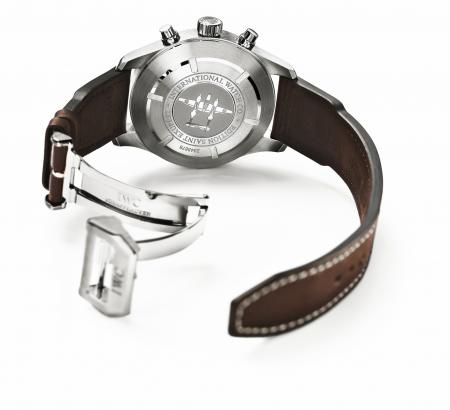IWC presents the Pilot’s Watch Chronograph Edition Antoine de Saint Exupéry
By MyWatch
In 2012, the year of thePilot’s Watches, IWC Schaffhausen dedicatesto this passionate humanist a chronographthat unites the aspirations of those pioneering days of aviation with modern watch technology.
A100 years ago, a young boy stood on the airfield of Ambérieu-en-Bugey in south-eastern France, looking on in wonder as the aircraft took off and landed. In those early days of modern aviation, the contraptions that took to the sky were as fascinating as the magnificent men who flew them. Eventually, the boy plucked up his courage and asked the pilot Gabriel Salvez to take him for a spin in the cockpit of a Berthaud-Wroblewski. He spun the somewhat sceptical pilot a yarn, claiming that his mother would have no objections. Salvez took him at his word and so, one sunny day in July1912,12-year-old Antoine de Saint-Exupéry had his first taste of flying: an experience that was to leave its mark on the future world-renowned poet and pilot for the rest of his life.
Pilot’s Watch Chronograph from IWC as a sixth tribute
Famed for its 70-year tradition in the manufacture of Pilot’s Watches, IWC Schaffhausen is using the anniversary of Antoine de Saint- Exupéry’s memorable first flight as an occasion to dedicate its sixth special edition to his memory: the Pilot’s Watch Chronograph EditionAntoine de Saint Exupéryin18-carat red gold (Ref. 387805) in a limited edition of 500 watches. For connoisseurs, the tobacco-coloured dial and calfskin strap with its cream-coloured quilted stitching immediately identify the chronograph as a typical “Saint Ex”. The elaborate surface finish featuring polished, silky-matte and structured elements enhances the overall quality of the watch’s appearance. This impression is underscored by the sun-pattern finish on the dial. The sapphire glass has antireflective coating on both sides and is secured against drops in air pressure. Developed and manufactured exclusively by IWC, the 89361-calibre movement is a technical masterpiece. It displays long periods of times on a single subdial. A special engraving embellishes the back of the watch. It depicts the last aircraft Antoine de Saint-Exupéry ever flew, a Lightning P-38. It was on 31 July 1944 that “Saint-Ex” took off in a machine like this to carry out a reconnaissance mission over occupied France and never returned. In 2003, wreck-age from his Lightning was salvaged from the Mediterranean Sea near Marseille.
Successful cooperation
In 2006, fragments of the aircraft, together with other exhibits, were displayed for the first time as part of a project organized jointly by IWC Schaffhausen and the Succession Antoine de Saint-Exupéry – d’Agay at the musée de l’Air et de l’Espace in Le Bourget, near Paris. The acclaimed exhibition marked the beginning of a relationship, which was based on mutual trust, Pilot’s Watch Chronograph Edition Antoine de Saint Exupérybetween Saint-Exupéry’s heirs and the Swiss watch manufacturer that has lasted to this day. “With our long tradition of manufacturing Pilot’s Watches, we feel that there are strong bonds that bind us to Antoine de Saint-Exupéry,” explains Georges Kern, CEO of IWC. “We were inspired by a man who was also a passionate designer and who obtained his first aeronautical patent in1936, the very year that IWC, with the same obsession for engineering, built its first Special Pilot’s Watch and unveiled it to the public. We have enormous admiration for a pilot who was prepared to risk his life in the name of technological progress. And we are honouring Saint-Exupéry, the great writer and humanist, with whose works many of us grew up. Mankind and its pursuit of happiness are themes that are prevalent throughout his work.” IWC Schaffhausen is a partner of the Succession Antoine de Saint-Exupéry – d’Agay society. The descendants of the passionate pilot ensure that the adventurer’s spiritual legacy lives on. IWC’s commitment also extends to the society’s charitable arm in the form of support for the Antoine de Saint-Exupéry Youth Foundation. True to his credo, “For human beings, there is only one truth: the truth that turns them into human beings” (from his novel “Wind, Sand and Stars”), the Foundation has dedicated itself to the famous Frenchman’s humanitarian legacy. Working with its partners, it helps young people worldwide who are growing up in difficult and often hostile circumstances. These young people are encouraged to build their own futures and to play an active role in society.
A tribute to Antoine de Saint-Exupéry
Since it started working with the Succession Antoine de Saint-Exupéry – d’Agay, IWC has used special editions of its Pilot’s Watches to commemorate the French author’s works that are closely linked to the pioneering days of aviation. The Pilot’s Watch Chronograph launched in 2006 was a tribute to the novel “Night Flight”. This was followed in 2007 by the Pilot’s Watch Automatic, which paid homage to his gripping work “Southern Mail”,and in 2008 by the Pilot’s Watch UTC, to mark his poetic novel “Wind, Sand and Stars”. In 2009 and 2010, the Big Pilot’s Watch Edition Antoine de Saint Exupéry honoured his outstanding life’s work. The special edition selected for 2011was the rarely made Big Pilot’s Watch Perpetual Calendar, and in 2012 the Pilot’s Watch Chronograph Edition Antoine de Saint Exupéry is a reminder of how the aviator, poet and humanist discovered his great passion.
The adventurous life of a flying pioneer
Antoine de Saint-Exupéry’s biography reads like a chronicle of modern aviation. Born in Lyon in 1900, he was taking flying lessons by the age of 21 and by 1922 already had his licence. In 1927, he flew on the Toulouse–Casablanca–Dakar route. That same year, he was appointed manager of a remote airfield in Morocco. This was the period that inspired his first novel, “Southern Mail”. In1929, Saint-Exupéry was appointed director of an airline in Buenos Aires. Although the introduction of regular night flights expedited postal deliveries, night-time flying,with the technology that existed at that time, was fraught with risk. His novel “Night Flight” is a tale of the challenges facing pilots and their heroism in surmounting them. In 1931, Saint-Exupéry was back in Northern Africa, working as an airmail pilot. After flying seaplanes for a brief period and piloting mailflights across Africa, his memorable time as an airmail pilot came to an end in 1932. During his attempt to break the long-distance record from Paris to Saigon in 1935, he crash-landed in the Egyptian desert and was saved virtually at the last minute from dying of thirst. A second attempt to break a flying record was likewise doomed to failure: in 1938, Saint-Exupéry left New York in the direction of Tierra del Fuego. After a brief stop-over, the aircraft made a crash landing and, once again, Saint-Exupéry survived, as if by a miracle. Following the outbreak of the Second World War, and by now a celebrated author and pilot, he was attached to a reconnaissance squadron. Demobilized after the ceasefire of 1940, he obtained permission to return to active military service in 1943. On 31 July 1944, “Saint-Ex”, as his admirers fondly referred to him, climbed into the cockpit of his Lightning P-38 to carry out a reconnaissance mission over occupied France. He never returned.
IWC Schaffhausen
With a clear focus on technology and development, the Swiss watch manufacturer IWC Schaffhausen has been producing watches of lasting value since1868. The company has gained an international reputation based on a passion for innovative solutions and technical ingenuity. One of the world’s leading brands in the luxury watch segment, IWC crafts masterpieces of Haute Horlogerie at its finest, combining supreme precision with exclusive design.

